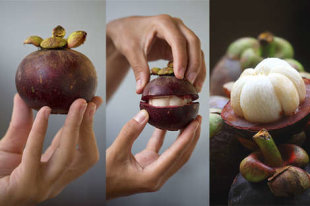
The elusive mangosteen is tough to find in the store, but easy to fall in love with.
Reader, meet mangosteen. Cited as an up-and-comer in the superfood world, the Southeast Asian fruit that's packed with a special class of antioxidants might be making its way to a supermarket or beauty aisle near you. You'll want to get your hands on some-and get some on your hands-as soon as possible.
I was first introduced to mangosteen while traveling in Thailand in the summer of 2007. It was served to me at an outdoor café in Bangkok alongside several other plump globes altogether unfamiliar to this New Yorker. Its rind was half removed, revealing flesh that looked not unlike a small citrus fruit that had been blanched by the sun. One by one, I pried its six white segments from their hemisphere of tough purple hull and savored the elusive, delightful flavor. Sort of like a lychee, I thought, but subtly more complex. Others have described its hard-to-pinpoint taste as evocative of peaches, clementines and mangoes (no relation).
I felt at once enlightened and deprived. Why did I have to wait so long and travel so far to find something so lovely and generously sweet? In retrospect, I blame the USDA, which banned the importation of mangosteen from Thailand-the number one source-because the fruit harbors foreign plant pests. In July 2007, perhaps at the very moment I was discovering the succulent fruit for myself, the FDA ended the ban, on the condition that all shipments be irradiated to kill insects before entering the country.
The U.S. imported 730 tons of mangosteen from Thailand in 2013 (for comparison, we bring in millions of tons of bananas annually), with smaller amounts coming from Mexico, Hawaii and the Caribbean, where the growing season is a scant six to 10 weeks from June to August. Though fully legal today, they are hard to find and they tend to fly from store shelves quickly despite hefty price tags. As we enter summer, when it's easiest to find mangosteens, a 10-pound carton from Hawaii is going for $40 wholesale in San Francisco. Comparable hauls from Thailand are selling for north of $50 there, and $65 in Los Angeles.
Mangosteen trees can only be grown in certain environments. They require high humidity and rainfall and can't survive in temperatures below 40 degrees or above 100 degrees. And they're stubborn. "The first fruit may take 8 years or, some say, as long as 15 years to appear the first time," explains Ian Crown, a grower in Puerto Rico and owner of the highly coveted url mangosteen.com. "Mine took mostly six to eight years to flower and produce their first fruit. I have one other species on my farm that took 12 years." Fortunately, Crown continues, they have a decent shelf-life. "The rind hardens in the first few days and can protect the delicate arils, the edible part, from further damage. In a fridge, you can get two weeks but they are usually eaten long before that." You can find the fruits of his labor in Whole Foods stores across the contiguous 48.
Their haunting sweetness is not the only thing that makes mangosteens such a hot commodity. The fruit is also one of the highest in xanthones, a type of polyphenol only found in a handful of plants, which has been shown in some studies to have antioxidant and anti-inflammatory properties. Mangosteens contain at least 68 distinct xanthones-50 in the rind alone-the most-studied of which is alpha-mangostin. They have long been used in traditional medicine in Southeast Asia.
The soothing, calming and antioxidant effects have attracted cosmetic companies such as Lather, which just launched its Mangosteen & Green Tea Hand Lotion, sourcing fruit from India and Thailand. Mangosteen extracts are also used in Origins VitaZing SPF 15 moisturizer, Fresh's luxuriousmangosteen oval soap and the Super Fruits anti-aging skincare line from 100% Pure.
Naturally, there are also a host of health drinks touting the benefits of the purple powerhouse. One of the newest is Vemma Renew, which uses a proprietary blend of extracts from mangosteen pulp and rind, green tea and aloe vera. Even Lipton and Snapple have gotten in on the mangosteen trend.
Crown is dismissive of companies jumping on the bandwagon over what he considers hyperbolic claims about mangosteens' health and beauty benefits. "Mine," he says, "are accompanied by zero claims other than, 'It is one of the finest tasting fruits you may ever have.' " That's a good enough argument for me.
- by Amanda Schupak
Originally published on YouBeauty.

No comments:
Post a Comment